Posted by Elena del Valle on April 27, 2020
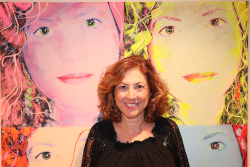
Hilary Topper, author, Branding in a Digital World
Photo: HJMT Public Relations
A podcast interview with author Hilary Topper is available in the Podcast Section of Hispanic Marketing and Public Relations, HispanicMPR.com. During the podcast, she discusses her book Branding in a Digital World with Elena del Valle, host of the HispanicMPR.com podcast.
Since 1992 Hilary has been the chief executive officer of HJMT Public Relations. She is also adjunct professor at Hofstra University, where she teaches digital communication, public relations tools, and persuasive presentation for undergraduate and graduate students.
Since 2011 she is the host of a weekly podcast (Hilary Topper On Air) and chief curator of HJMT Media Company, LLC, where she writes for two blogs, NYLifestyleBlog.com and ATriathletesDiary.com. According to her biography her blogs receive more than 50,000 unique visitors a month.
She wrote Branding in a Digital World to offer small business owners information on how to grow their businesses through digital media. Her first book, Everything You Ever Wanted to Know About Social Media, but were afraid to ask… was published in 2009.
To listen to the interview, scroll down and click on the play button below or locate the “Podcast” section on the right hand side, then choose “HMPR Hilary Topper” or download the MP3 file to your iPod or MP3 player to listen on the go, in your car or at home from the RSS feed. Some software will not allow flash, which may be necessary for the podcast player. If that is your case, you will need to download the file to play it. To download it, click on the arrow of the recording you wish to copy and save it to disk. The podcast will remain listed in the April 2020 section of the podcast archive.

Click to buy Branding in a Digital World
Posted by Elena del Valle on April 22, 2020
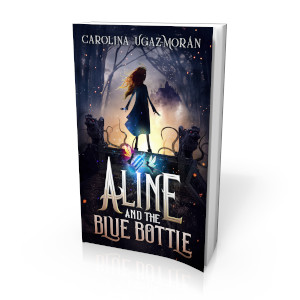
Aline and the Blue Bottle
Photos: Damonza (book cover), Farshad Khoshroo (author photo)
Carolina Ugaz-Moran, a native of Spain raised in South America and the United States with degrees in biochemistry and creative writing from the University of Wisconsin, spent ten months spread over 15 years writing Aline and the Blue Bottle, her first book. The 303-page softcover book published in 2019 includes Spanish and Quechua words, a map at the beginning as well as a page of Spells and a glossary at the end. Her target audience? Children eight to twelve years old and older.
“The cover depicts Aline standing on the House of Haunted Gargoyles facing her future, a magical floating castle with mysterious creatures flying around,” the author said by email when asked about the cover art. “She is at the entrance of a forest, with vines that surround her and behind her are her two loyal and close magical friends carrying the blue bottle. The cover also holds secrets (just like within the book).”
She went on to explain, “The title highlights Aline, her adventure, and her first quest to find the blue bottle and save many worlds. It also shows strength, courage,passion, and empowerment – in this case for a girl, depicting mysteries and magic which Aline and her friends will have to face together.”
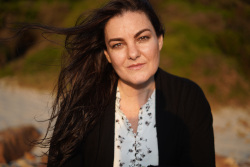
Carolina Ugaz-Moran, author, Aline and the Blue Bottle
When asked why she included Quechua she said, “I think the more exposed we are to languages as children, the more neurons we connect and the better we can develop the ability to become multilingual, so why not add Quechua and Spanish! But for me, it is more than learning a new language, it is about understanding a culture and exposing oneself to the abundance fountain of knowledge that each language provides.
Also, a few years ago, I found out that even though several people can speak Quechua (8-10 million people) very few people can actually read and write it due to the lack of printed material in Quechua. There have been efforts from the Peruvian, Ecuadorian, and Bolivian governments to introduce the language as an intercultural bilingual education; however, some indigenous people in each of these countries are having their children study in Spanish for the purpose of social and economical advancement. I thought I tried to help out a little plus I can learn on the way. Fun fact: there are about 45 varieties of Quechua which are all classified as separate languages and in addition, there are several dialects.”
When asked if her biochemistry studies help her or play a role in the project she said, “Yes, as well as my love for science and nature. This can be seen in several places. The chimera twins. They are powerful sylph sisters who have an important role in the book series. A chimera is a single organism that contains two sets of DNA with the code to make two separate organism. Simply put, it is an organism made up of cells from two or more different individuals.
The explanation of magic and how it flows, it somewhat reflects the states of energy as well as the law of conservation of energy. The blue and red stars and how from earth, the cooler stars appear red, and the high temperature stars appear blue. The symbiotic relationship between sharks and remora fish, I am an animal lover and I am looking for ways for people to admire and be kind to even the scariest of animals.”
She is working on the second book in the Aline series. It will be called Aline and the Kron Queen.

Click to buy Aline and the Blue Bottle
Comments:
Filed Under: Books
Posted by Elena del Valle on April 15, 2020
Cape Fear Valley Health System (CFVHS), an eight-hospital, $1.2B nonprofit health system, has retained WittKieffer to assist in the recruitment of their Vice President, Marketing and Communications (Vice President).
As the organization looks to transform its messaging and advance it’s brand, the new Vice President will serve as a vital – click to read the entire Job Ad for: Vice President, Marketing and Communications, Cape Fear Valley Health System
Posted by Elena del Valle on April 13, 2020
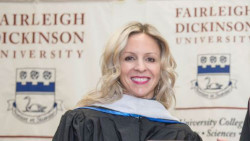
Krista Jenkins, Ph.D., professor, Politics and Government, Fairleigh Dickinson University
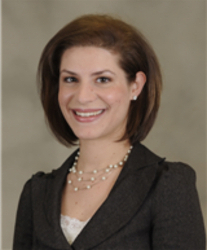
Julie Kalabalik-Hoganson, PharmD, director, Pharmacy Practice, Fairleigh Dickinson University
Photos: Krista Jenkins, Julie Kalabalik-Hoganson
A podcast interview with Krista Jenkins, Ph.D., professor of Politics and Government, and Julie Kalabalik-Hoganson, PharmD, director, Pharmacy Practice, Fairleigh Dickinson University, about pharmacists in COVID-19 front lines is available in the Podcast Section of Hispanic Marketing and Public Relations, HispanicMPR.com.
Julie is associate professor of Pharmacy Practice at Fairleigh Dickinson University School of Pharmacy and Health Sciences. She coordinates and teaches several courses in the Doctorate of Pharmacy program. She is a registered pharmacist in New Jersey and is dual board certified in pharmacotherapy and critical care.
Krista is the director of FDU’s survey research center, The FDU Poll. She is the author or co-author of A New Engagement? Political Participation, Civic Life and the Changing American Citizen, Mothers, Daughters, and Political Socialization, and Where Have All the Heroes Gone?
To listen to the interview, scroll down and click on the play button below or locate the “Podcast” section on the right hand side, then choose “HMPR Krista Jenkins, Ph.D., Julie Kalabalik-Hoganson, PharmD” or download the MP3 file to your iPod or MP3 player to listen on the go, in your car or at home from the RSS feed. Some software will not allow flash, which may be necessary for the podcast player. If that is your case, you will need to download the file to play it. To download it, click on the arrow of the recording you wish to copy and save it to disk. The podcast will remain listed in the April 2020 section of the podcast archive.
Posted by Elena del Valle on April 6, 2020
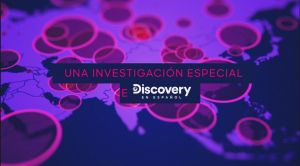
Video: Discovery en Español
Looking for more information on the COVID-19 pandemic in Spanish? At 9 p.m. E/P Wednesday April 8, 2020 Discovery en Español will air COVID-19: Pandemia 2020, a 43-minute special. The original program was in English. The Discovery en Español version will be in Spanish. Scroll down to watch a video clip in Spanish.
The special features suspenseful background music, news clips, domestic and international archive footage and on camera interviews with a handful of individuals from Mercatus Center at George Mason University, University College London, Council on Foreign Relations, The New York Times, and University Wisconsin-Madison.
The special outlines the general way the disease spread throughout China and other countries around the world in months, prompting a widespread quarantine in China, quickly mimicked by other countries.
It explains that the Center for Disease Control and Prevention (CDC) refused to adopt the COVID-19 test offered by the World Health Organization (W.H.O.), insisting on developing its own. This caused grave delays as the initial tests were faulty. According to one expert interviewed on the program flattening the curve efforts will result in the same number of people being stricken by the virus. It will take longer than without the social isolation measures.
The program was produced by ITN Productions for the Science Channel. The executive producers for ITN Productions are Ian Russell and Sarah Jane Cohen; Nick Powell is the producer. The executive producer for Discovery and Science Channel is Gretchen Eisele. The special will repeat on Sunday, April 12 at 10 p.m. and will also be available in the Discovery en Español Go app.
Posted by Elena del Valle on April 1, 2020
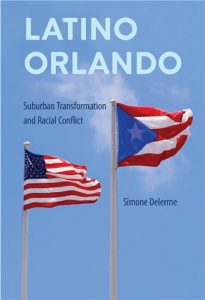
Latino Orlando
Photos: Simone Delerme
Simone Pierre Delerme, Ph.D. is McMullan associate professor, University of Mississippi’s Center for the Study of Southern Culture and Department of Sociology and Anthropology. Targeting college students, educators, policy makers, and others interested in migration experiences she wrote Latino Orlando Suburban Transformation and Racial Conflict (University of Florida Press, $80), a 181-page hardcover book mainly about Puerto Ricans in the Orlando area published this year.
“The intended academic audience includes undergraduate students and scholars in the disciplines of Anthropology, Sociology, Latino Studies, American Studies, Southern Studies, and Florida Studies,” she said by email. “The book is concise and intentionally written in simple enough language to be adopted by introductory undergraduate courses in all of these disciplines, but the engagement with critical race theory will appeal to more theoretically driven, advanced audiences.”
The most significant finding or takeaway from the book? “Latino migrants are complicating racial categorizations and challenging the deep-rooted black-white binary that has long prevailed in the American South. Language and the changing soundscape became a way of racializing and segregating Latino communities, leading to the growth of suburban ethnic enclaves,” she said.
“The research was conducted in the counties that are referred to as Greater Orlando or the Orlando Metropolitan Statistical Area,” she said when asked about the title. “Therefore, I wanted to include the term ‘Orlando’ in the title so audiences knew the part of the south that I focus on. The population I focus on is primarily Puerto Rican, but does include the voices of other Latinos. Therefore, the term ‘Latino’ was more inclusive and representative of the population documented in the book.”
The book features Introduction: New Destinations; Buenaventura Lakes; Latinization, Landscapes, and Soundscapes; The Fractured American Dream; Social Class Distinctions and the Latino Elite; The Encargado System; and Conclusion. The first three chapters focus mainly on Puerto Ricans and a Puerto Rican concentrated residential and commercial enclave, the author said. The next two chapters, about Latinos involved in business networking organizations and the Encargado System, features Cuban, Colombian, Guatemalan, Venezuelan, and Mexican perspectives.
When asked about the term Latino or Hispanic she said, “In the book, I use the terms Latino and Hispanic interchangeably, although there is a difference. Most of my informants and interviewees preferred to be identified as ‘Mexican,’ ‘Venezuelan,’ or ‘Colombian,’ for example. When they did use one of the umbrella ethnic terms, the preference was actually Hispanic, not Latino. It really depended on the individual’s preferences though, which is why I use both terms. I try to use the language that my interviewees and informants use to describe themselves. The term Puerto Rican is also tricky because those from the diaspora are sometimes identified and perceived as Nuyorican, and there is a distinction made between those from the island of Puerto Rico and those that were born and raised in New York City, for example. I use the term Puerto Rican if my interviewees and informants identified that way. Usually those who were born on the island of Puerto Rico or have family from Puerto Rico identified as Puerto Rican.”
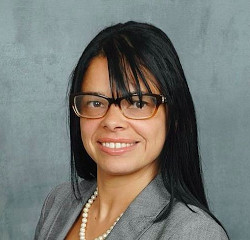
Simone Delerme, author, Latino Orlando
“The term Hispanic, which the United States Census Bureau created in the 1970s, refers to all people in the United States whose ancestry is from one or more Spanish-speaking countries,” she said to explain how she distinguished Hispanic from Latino in the book. “The term thus emphasizes language, not geographic origin, as the identifying factor. The term Latino, which originated within the community, instead focuses on geography and is ‘an attempt to embrace all Latin American nationalities, including those which neither have ties to Spain nor are necessarily Spanish-dominant groups,’ such as Brazilians and various indigenous groups living in Latin America.”
Delerme specializes in migration to the United States South, with interests in race relations, integration and incorporation, community development, and social class inequalities. The book cover is based on a photograph Delerme took of a house in the Buenaventura Lakes suburb that had an American flag and Puerto Rican flag flying in the front lawn. She is conducting fieldwork for a second book, International Memphis: Migration and Transformation in the Mid-South. She is researching “how migrants are being incorporated into the social, political, and economic life of Memphis, Tennessee, a city with a history of segregation and a historic black-white racial binary.”
From idea to publication the project required 10 years. She received an in-residence fellowship from the Center for Puerto Rican Studies at City University of New York (CUNY) Hunter College after she completed her data collection. She is also Truman Scholar, which includes a financial award, which facilitated the fieldwork and data collection for the book. None of the informants or interviewees mentioned in the book was compensated financially, she said.
The book is part of the Southern Dissent series, which seeks to explore and analyze the role of dissent in the south, and document the experiences of dissenting groups during different time periods and in different places.
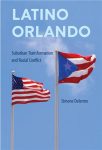
Click to buy Latino Orlando
Comments:
Filed Under: Books






















